- Home
- Anna Carey
The Boldness of Betty
The Boldness of Betty Read online
Praise for Other Books by Anna Carey
The Making of Mollie
‘I loved Mollie – she is rebellious … thoughtful and funny.’ thetbrpile.com
‘A girl’s eye view of early feminism … exciting, vivid … with the impulsive and daring Mollie.’ Lovereading4kids.co.uk
‘For junior feminists … a must-read.’ The Irish Times
‘Mollie’s struggles are strikingly relevant to the teenagers of today.’ Sunday Business Post
Mollie on the March
‘I cannot tell you how much I adore these books. They’re funny and clever and Mollie is a BRILLIANT character … I found myself moved by the plight some of these women endured in their struggle to win rights that we take for granted today.’ Louise O’Neill
‘It’s wonderful but also brought home how hard the struggle was, how scary, and that’s giving me courage to keep on pushing for our rights today.’ Marian Keyes
‘Just as charming as the first … a deeply relatable story and a welcome reminder that Irish history has more to it than nationalist rebellions.’ The Irish Times
The Real Rebecca
‘Definite Princess of Teen.’ Books for Keeps
‘The sparkling and spookily accurate diary of a Dublin teenager. I haven’t laughed so much since reading Louise Rennison. Teenage girls will love Rebecca to bits!’ Sarah Webb, author of the Ask Amy Green books
‘This book is fantastic! Rebecca is sweet, funny and down-to-earth, and I adored her friends, her quirky parents, her changeable but ultimately loving older sister and the swoonworthy Paperboy.’ Chicklish Blog
‘What is it like inside the mind of a teenage girl? It’s a strange, confused and frustrated place. A laugh-out-loud story of a fourteen-year-old girl, Rebecca Rafferty.’ Hot Press
Rebecca’s Rules
‘A gorgeous book! … So funny, sweet, bright. I loved it.’ Marian Keyes
‘Amusing from the first page … better than Adrian Mole! Highly recommended.’ lovereading4kids.co.uk
‘Sure to be a favourite with fans of authors such as Sarah Webb and Judi Curtin.’ Children’s Books Ireland’s Recommended Reads 2012
Rebecca Rocks
‘The pages in Carey’s novel in which her young lesbian character announces her coming out to her friends and in which they give their reactions are superbly written: tone is everything, and it could not be better handled than it is here.’ The Irish Times
‘A hilarious new book. Cleverly written, witty and smart.’ writing.ie
‘Rebecca Rafferty … is something of a Books for Keeps favourite … Honest, real, touching, a terrific piece of writing.’ Books for Keeps
Rebecca is Always Right
Fun … feisty, off-the-wall individuals and a brisk plot.’ Sunday Independent
‘Be warned: don’t read this in public because from the first sentence this story is laugh out loud funny … This book is the funniest yet.’ Inis Magazine
‘Portrays a world of adolescent ups and downs … Rebecca is at once participant in and observer of, what goes on in her circle, recording it all in a tone of voice in which humour, wryness and irony are shrewdly balanced.’ The Irish Times
To Susan Houlden, who had to wait a long time to read this book, and in memory of my great-grandfather Robert Carey, dock worker and 1913 striker
Acknowledgements
Thanks most of all to Susan Houlden, my editor at The O’Brien Press, who was very patient with me when this book ended up taking much, much longer to write than any of us expected. Many thanks to Helen Carr, whose idea it was to write about the 1913 Lockout, to Louise Lamont for all her help and to Aishwarya Subramanian for kindly taking the time to read the manuscript. Thanks to Jane Casey, Harriet Evans, Sarah Hughes, Sarra Manning and Aoife Murphy, aka the Lord Peter Casting Club, for the serious literary discussions that provided cheer and intellectual stimulation in stressful times. I send a beaming Hiddlesun to you all. And special thanks to Lauren O’Neill for what might be my favourite cover ever, and everyone at The O’Brien Press.
Thanks to the extended Carey and Freyne families, especially my nephew Arlo, who is a very discerning reader, and my cousin Elaine, whose house I borrowed for Betty. Thanks and all my love to my husband Patrick Freyne, who offered very helpful and necessary advice and support.
Several historians and librarians were kind enough to respond to my requests for research help. Mary Jones and Theresa Moriarty were generous with their time. Thanks too to Katherine McSharry and Eoin McCarney of the National Library, who sourced a crucial and incredibly helpful pamphlet by Manus O’Riordan on the cultural life of Liberty Hall in its early years.
But most of all, this book could not have been written without Pádraig Yeates, who not only wrote the definitive book on the lockout, Lockout: Dublin 1913, but was incredibly patient when I kept emailing him with more and more questions over the course of many months. I named a union-supporting bakery after him in the book, which was the very least I could do. I did my best to make the book historically accurate, but it’s a work of fiction not a history book, and I am not a historian. Any historical errors are, I can assure readers, entirely my own.
Contents
Title Page
Dedication
Acknowledgements
Chapter One
Chapter Two
Chapter Three
Chapter Four
Chapter Five
Chapter Six
Chapter Seven
Chapter Eight
Chapter Nine
Chapter Ten
Chapter Eleven
Chapter Twelve
Chapter Thirteen
Chapter Fourteen
Chapter Fifteen
Chapter Sixteen
Chapter Seventeen
Chapter Eighteen
Chapter Nineteen
Chapter Twenty
Chapter Twenty-One
Chapter Twenty-Two
Chapter Twenty-Three
Chapter Twenty-Four
Chapter Twenty-Five
Chapter Twenty-Six
Chapter Twenty-Seven
Chapter Twenty-Eight
Historical Notes: Fact and Fiction
About the Author
Copyright
Chapter One
I thought I’d begin these memoirs by writing down my name and where I live and how many brothers and sisters I have (one too many if you ask me), but right now I’m so annoyed I’m just going to write down what happened a few minutes ago. I was sitting down at the table with this new notebook and a bit of old pencil that Ma had left behind the kitchen clock, getting ready to write down all these fascinating facts, when who should come into the kitchen but my stupid big brother Eddie.
‘Is that the notebook Da got for you?’ he said, because our da had come home from the docks yesterday with a big notebook full of empty blank pages that had been found on the quay after they’d unloaded a load of crates that morning. It really had fallen out somewhere and the cover was all damp so the foreman said he could take it, just in case you were thinking that was another way of saying he’d pinched it. Da’s the most honest person in the world. Besides, you’d lose your job down the docks if you tried any of that thieving business so you’d have to be pretty stupid to try nicking anything, and Da isn’t stupid. Da gave the notebook to me after tea last night. He knew that I was going to miss having something to scribble on now I’ve left school.
I hoped Eddie would leave me alone if I answered his question.
‘It is, yeah,’ I said. And then I looked back at the page because I was trying to think of the most dramatic way to introduce myself. Eddie, being Eddie, didn’t take the hint.
‘What are you writing in
it?’ he said in a smirking sort of voice, as if the idea of anyone writing anything down was utterly ridiculous.
‘My memoirs,’ I said, without looking up from the blank page.
Eddie stared at me as if I was talking Russian.
‘What’s a memoir when it’s at home?’ he said. You can tell he’s never set foot in Charleville Mall Library even though it’s only down the road. He does not have a good vocabulary, mostly because he barely listens to a word anyone else says. I, on the other hand, have an excellent vocabulary, as you will discover in these memoirs.
‘It’s when you write about yourself,’ I said. ‘Like the story of your life.’
And of course Eddie, the big stupid lump, laughed as if this was the funniest thing he’d ever heard. When he could finally speak he said, ‘I’m fairly sure no one is going to want to read the story of your life.’ He put on a stupid high-pitched voice. ‘I went to the library. Then I came home. Then I took my stupid-looking dog for a walk. Then I went to bed.’ He went back to his usual voice. ‘Very exciting, I don’t think.’ And he laughed again at his own ‘wit’.
‘Well, maybe I’ll be rich and famous by the time it comes out,’ I said, ignoring his mockery. ‘Then lots of people will want to read about my early years.’
Eddie ruffled my hair in that annoying way he has and said, ‘If you say so, kiddie’ in a very condescending way (that’s another word I learned from the books in the library).
Then he wandered off to the front room, which is where he sleeps on the sofa, to draw the curtains and change out of his work uniform. He works for the tram company, in their parcel delivery department. I can hear him singing from my spot here in the kitchen. There’s never any peace around here, even though Da’s still out at work and Ma is down the road having tea with Mrs Connolly so technically I have the kitchen all to myself.
But anyway, now that he’s out of the kitchen and I’ve calmed down a bit, I can introduce myself to my future readers. My name is Betty Margaret Rafferty. Actually, my name is Elizabeth Margaret Rafferty, after my grandma who died before I was born, but everyone always calls me Betty. I was born in May 1899, which means I turned 14 a few weeks ago. I also left school yesterday, but more on that later.
I live at 48 Strandville Avenue in the North Strand in Dublin, with my ma and my da and my stupid brother Eddie. The house has one window at the front, and from the outside you’d think it was only one level, but when you come in the front door you realise that only the front room and the hall are on the ground floor. There’s one set of stairs going up to the two bedrooms and another set of stairs going down to the kitchen and the scullery. Ma and Da have the bigger room upstairs, I’m in the little one and Eddie sleeps on the sofa in the front room on the ground floor. And we’ve got the toilet out in the back garden, of course.
Until two years ago I shared the small room upstairs with my sister Lily, but then she married Robert Hessian. We always call him by his full name, Robert Hessian, even Ma. I don’t know why. There’s not much to say about him apart from the fact that he works down the docks, same as my da. He’s the most boring person I’ve ever met. You forget whatever he’s said the minute after he says it. If you asked me to describe what he looked like, I don’t think I could do it, even though I’ve known him all my life because he’s the same age as Lily and he grew up just around the corner from us, on Leinster Avenue. He’s got brownish hair – or is it more mousey coloured? And an ordinary sort of nose … see, I can’t do it.
Even though Robert Hessian is extremely boring, the day Lily got married was the happiest day of my life. Not because I was particularly delighted for her (in fact, I was more sorry for her than anything else, having to live with the most boring man in the world), but because that night I finally got to sleep in a bed by myself for the very first time. Me and Lily had shared the narrow little bed (which is all that fits in that tiny room, that and a bockety old wardrobe Da got in the pawn shop) ever since I was tiny.
When we shared the bed, we slept top-and-tail, which means Lily’s pillow was at one end and mine was at the other, but it was still an awful squash, especially as Lily made me sleep on the side closest to the wall, which meant that whenever I bent my legs I bashed my knees against the wall. And of course I had her horrible smelly clodhopping feet next to my face all night, which I wouldn’t wish on my worst enemy.
If Ma ever read this, she would say I was being ridiculous and that Lil’s feet are very dainty and don’t smell at all, and that she’s always had a bath once a week and is perfectly clean, but Ma didn’t have to share a bed with Lily for twelve years. I did and I know. Lily didn’t go very far when she moved out, but as long as she moved out of that bed I didn’t care. She and Robert Hessian moved in with his ma and da in Leinster Avenue. Mr and Mrs Hessian turned the front room into a proper bedroom for them, and they have a big brass bed and everything.
Of course, Eddie didn’t approve of me getting a whole bedroom to myself after Lily left. He thought he should have it ‘as the son of the house’ and I should get the sofa in the front room, but Ma said she couldn’t have her daughter sleeping in the front room where any Tom, Dick or Harry can see in the window, even with the lace curtains.
‘What if someone walked past and saw her in her shift?’ she said.
‘What if someone came by and saw me in my vest?’ said Eddie, very annoyed, but Ma said no one would want to look at him in his vest, and if they did see him, they wouldn’t care, and I think she’s right and said so. Eddie was very insulted and walked out of the room in a huff.
Anyway, I have the bed all to myself now, but Eddie’s clothes and things are in the wardrobe and I only get a tiny corner to put my belongings in. Not that either of us have a lot of clothes. We can’t afford them. But the clothes we do have are all made by Ma, which means my frocks are beautifully put together even though there aren’t very many of them.
Ma is very good at making clothes, and she does a bit of dressmaking for ladies in Drumcondra and Clontarf. When she’s busy with her sewing we can’t go into the front room because she’ll have bits of material and patterns and things spread out all over the floor. When it comes to our own clothes we all help out with the cutting and all that, but she’d never trust us to cut out one of her rich ladies’ frocks. When she’s not doing sewing she looks after the house and all of us.
So that’s Ma. Then there’s Da. He works on the docks, like lots of the men around here, which means he’s been on strike a lot recently. If you don’t know what a strike is (and maybe they’ll have stopped having them by the time anyone reads these memoirs), it’s when workers walk out of their jobs because they feel they’re not being treated fairly. They refuse to go back until the employers agree to change things. Sometimes this works and sometimes it doesn’t, but as Da says, you’ve got to try, haven’t you? Da doesn’t talk much, but when he does, he usually says something sensible and he knows how to make me feel better. Sometimes, though, even he can’t do anything to help. Like yesterday, which was one of the worst days of my whole life.
It was the last day of the school term, but for me it was the very last day of school ever. Same for all my classmates. I don’t know anyone whose family can afford to pay the fees for secondary school. Ali – he’s my friend Samira’s big brother – once told me that in America children don’t have to pay to go to secondary school, but even if that’s true there’s no chance of that happening here in Dublin. Only rich boys and girls get to go to secondary school. The rest of us have to go out and work. I learned that a long time ago.
Most of my class in school were delighted to be leaving forever, but I wasn’t and neither was Samira. We spent the whole walk home trying not to cry and not quite succeeding. We were so miserable we didn’t even want to talk to each other about how bad we felt, and when I got home I certainly didn’t want to talk to any of my family, but I couldn’t avoid seeing Ma because she let me into the house.
‘There you are!’ she said cheerfull
y as she opened the door. ‘Oh come now, Betty, what are you looking like that for? Most girls would be glad to be rid of school.’
Well, that did it.
‘You know I’m not!’ I said, so loudly that our dog Earnshaw stuck his head out of the kitchen to see what was going on.
Ma folded her arms across her chest, the way she does when she’s about to give out to you.
‘Don’t take that tone, miss!’ said Ma. ‘I never thought a daughter of mine could be so ungrateful.’
‘I’m not ungrateful!’ I said.
‘You’re going to a decent job in that cake shop,’ Ma went on as if I hadn’t spoken. ‘And when your work is done you’ll be sleeping in your own bed at night, which is more than I was able to do when I was your age.’
‘You don’t understand …’ I began, but Ma interrupted me.
‘You’re right,’ she said. ‘I certainly don’t. And if you can’t be more cheerful …’
Well, I couldn’t. And I suppose she knew it, because she didn’t try to stop me when I ran through the scullery, out the back door and right to the end of the garden. I sat on the grass with my back against the door of the lavatory, where you couldn’t see me from the house. And then I cried and cried.
After a while I could hear Ma calling me, but I didn’t answer. I just sat there with my arms wrapped around my shins and my head buried in my knees. Earnshaw finally found me, of course, but Earnshaw would never give me away. He just lay at my feet and went to sleep. Every so often a train rumbled past on the line that runs just a few yards from our house.
It must have been hours later when I heard someone walking around the back of the toilet. Then someone sat down beside me. I knew without looking up that it was my da. He put his arm around me, but I didn’t lean into him. I just huddled up stiffly with my face buried in my knees and Earnshaw curled up on my shoes.
‘I know it’s hard for you, Betty,’ said Da. His voice is gruff, but there’s something warm about it too. It’s how you’d imagine a nice warm coal fire would sound like if it could talk.

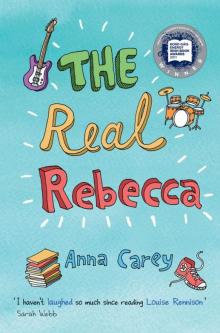 The Real Rebecca
The Real Rebecca Once
Once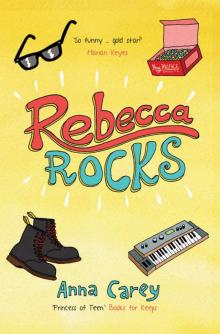 Rebecca Rocks
Rebecca Rocks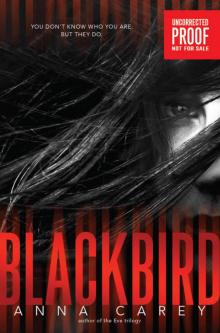 Blackbird
Blackbird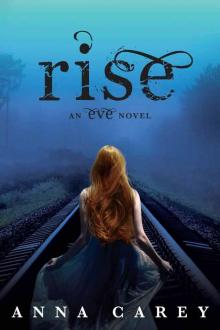 Rise
Rise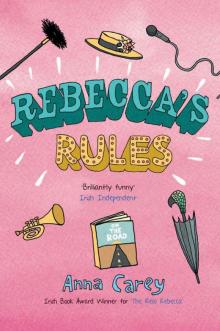 Rebecca's Rules
Rebecca's Rules Deadfall
Deadfall Eve
Eve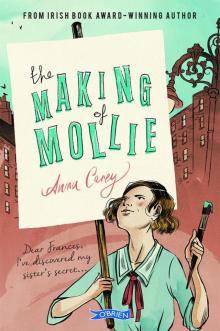 The Making of Mollie
The Making of Mollie Sloane Sisters
Sloane Sisters Survival of the Fiercest
Survival of the Fiercest This Is Not the Jess Show
This Is Not the Jess Show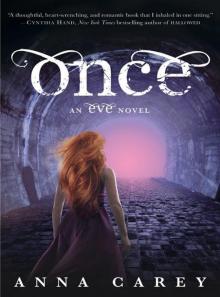 Once: An Eve Novel
Once: An Eve Novel